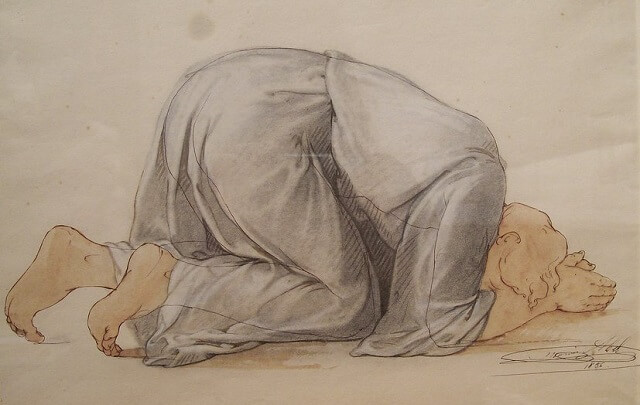
“בֹּאוּ, נִשְׁתַּחֲוֶה וְנִכְרָעָה; נִבְרְכָה לִפְנֵי-ה’ עֹשֵׂנוּ.”
“Come, let us prostrate ourselves, kneel and bend our knees before the Eternal our Maker.” (Psalms 95:6)
The psalmist mentions three methods of bowing before God:
The order in the verse, however, is the opposite of the usual pattern.
Ordinarily, people develop over the years, growing in piety and dedication to lofty goals. We start with a certain degree of reverence. Over time, the light grows stronger and breaks forth; it surges and occasionally overwhelms us with its brilliance.
The usual progression thus begins with the formal act of bowing. We then proceed to a more heartfelt expression of reverence by kneeling. And finally, we express total acceptance and submission to God by prostrating in a prone position on the ground.
Sudden Illumination
There is, however, a less common path. When Moses gazed at the burning bush, the entire direction of his life immediately changed. When Saul came across a band of prophets, he unexpectedly experienced prophetic spirit and “became a different person.” When Elijah cast his mantle over Elisha, the encounter swiftly transformed Elisha from wealthy farmer to master prophet.
The psalmist is referring to cases like these, when the sudden appearance of brilliant illumination overwhelms an individual, who responds with absolute submission and acceptance.2
Due to his stunned wonder, he cannot handle even a regular mode of prayer. He is unable to continue with life as if nothing happened.
Such a person needs to modulate his emotions to accommodate this powerful experience of holiness. At first, when overwhelmed by the staggering revelation of Godly influence, his response is complete submission. He lies prone on the ground. He demonstrates self-effacement before the brilliant revelation of God’s spirit.
Subsequently, he is able to resort to כריעה, kneeling. His entire body lowers before God, but it is only the knees that actually bend and submit to God.
Finally, he limits his sense of wonder and devotion to בריכה, bending the knees. This form of bowing utilizes the knees without affecting other parts of the body.
Functioning in a World of Deeds
Why is it important to gradually pull back from complete submission?
As the psalmist stresses, we are bowing down “before the Eternal, our Maker (עושנו).” God placed us in a world of deeds and actions (עשיה). God wants us to live a life of goodness and integrity, to conduct ourselves according to the path of Torah and mitzvot.
But when the soul’s emotions burst out without limits, they distort the realm of action.
In order to establish a level of ethical living that is not crippled by overwhelming spiritual revelations, we need to acquire a degree of distance from God. It is necessary to forgo lofty solitude and regain a regular state of social interaction. This allows us to set the foundations for proper conduct in practical life.
The soul that experienced profound illuminations learns to restrict its spirit and aspirations. In this way, one may attain the highest level that can be realized in a world of deed and action.
(Adapted from Olat Re’iyah vol. I, pp. 44-45)
1 See Mishneh Torah, Laws of Prayer 5:13.
2 Cf. Orot HaTeshuvah chapter 2, where Rav Kook describes two paths of teshuvah: the first is through gradual advance, and the second is sudden and radical.
Illustration image: ‘Figure kneeling in prayer’ (Francois-Barthelemy-Marius Abel, 1856)





